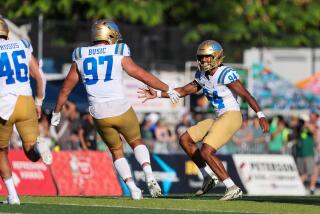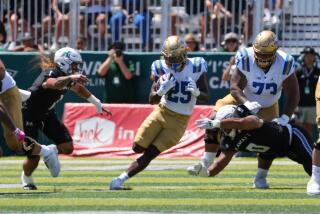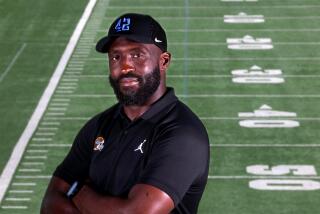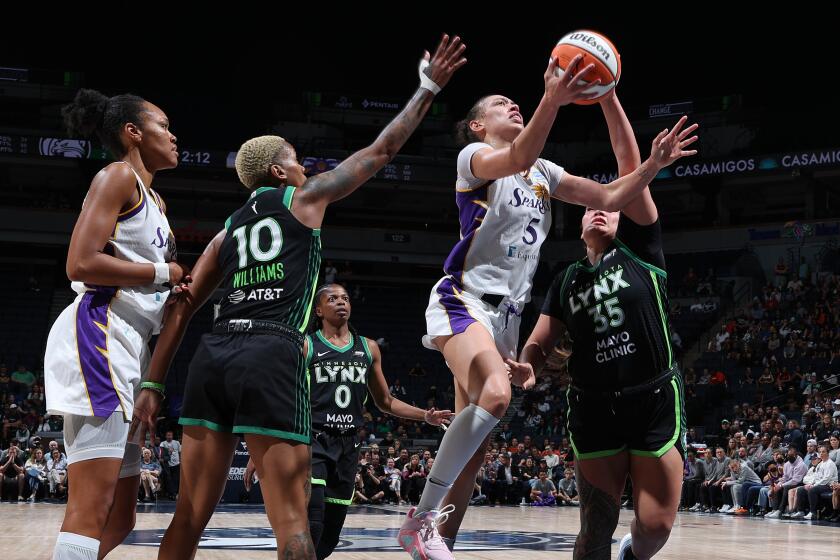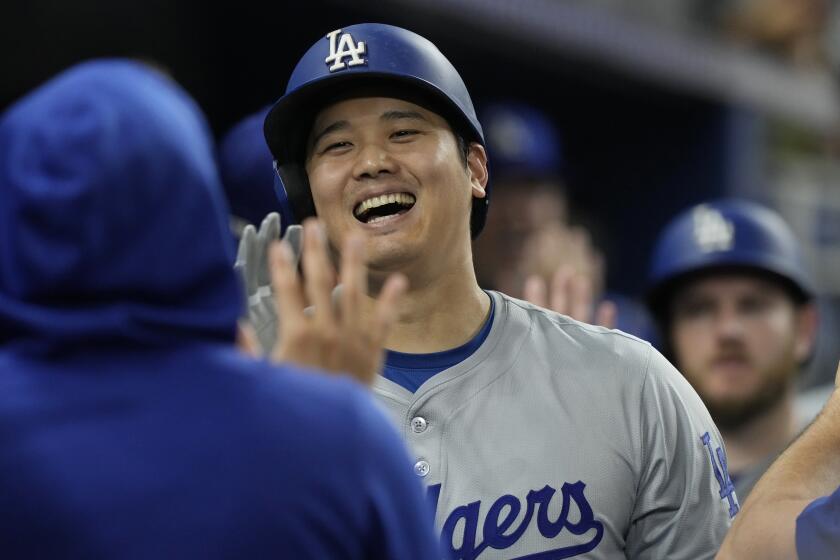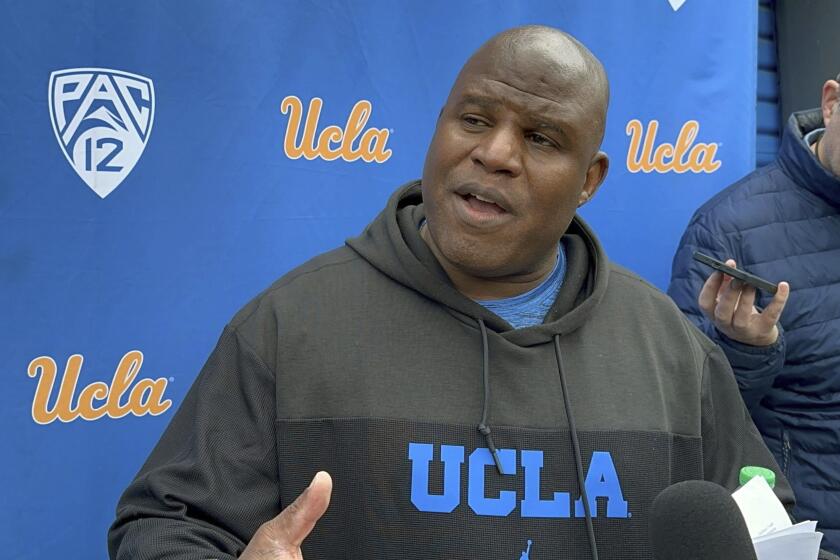Column: Marcus Mariota has a kindred Hawaiian/Samoan spirit in Bob Apisa
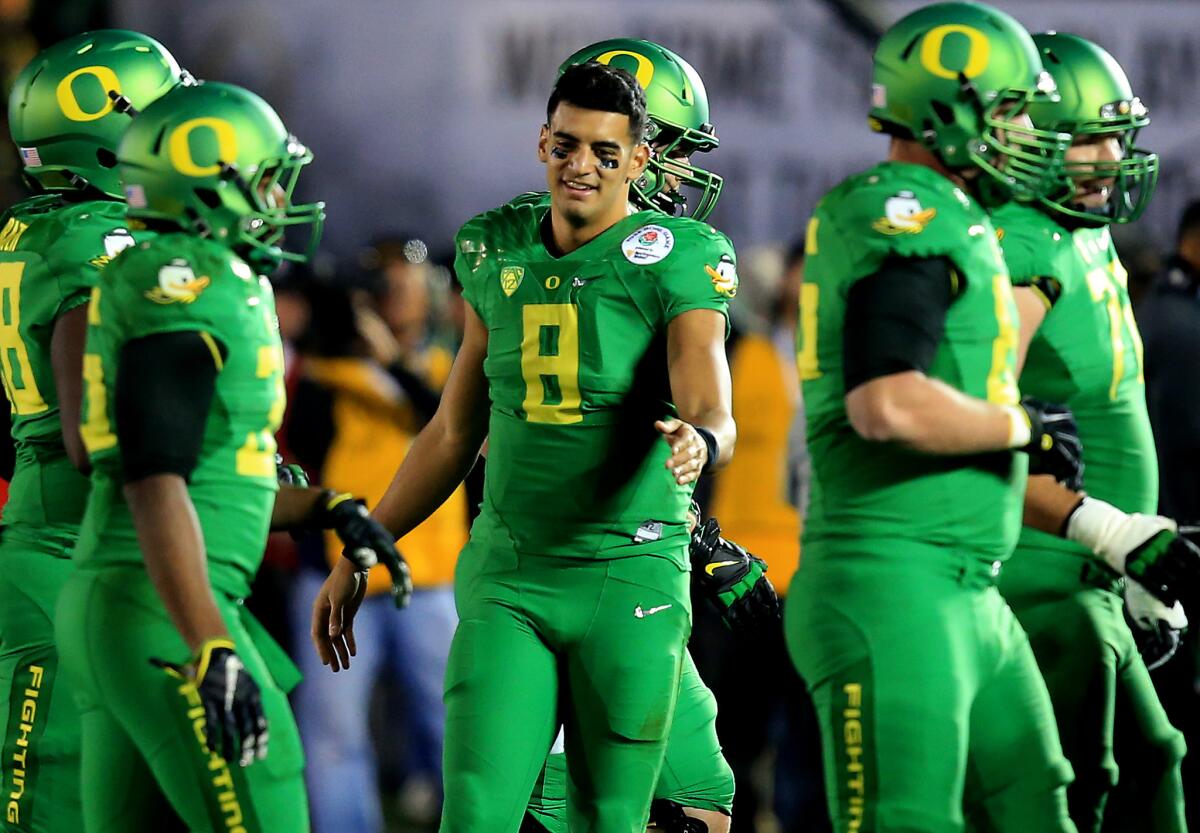
The godfather of the Hawaiian pipeline that brought us Marcus Mariota and his football wonders had a great New Year’s Day.
Bob Apisa, age 69, sat in front of a big TV at home in Granada Hills on Thursday, surrounded by family — even grandchildren —and watched in wonder as his school and his legacy had an unforgettable day.
His school, Michigan State, won, beating Baylor in the Cotton Bowl.
And when Mariota led his Oregon Ducks to a dazzling 59-20 victory over Florida State in the Rose Bowl, it was the cherry on the hot fudge sundae. It was a further fulfillment of Apisa’s pioneering work for Samoan and Hawaiian players in college football.
Apisa, the Rose Bowl and Hawaiian players are joined at the hip. If Apisa allows himself a moment of credit for Mariota even being here, playing on the mainland, winning the Heisman Trophy and leading his Ducks to the national championship game, it is justified.
“I was so proud of him,” Apisa said after the game. “It never ceases to amaze me how composed he is. When he won the Heisman, it brought tears to my eyes. It wasn’t because he is an Island kid, but because of how well he represents America.”
Apisa is part Samoan, on his father’s side. So is Mariota.
Apisa left what is now American Samoa in 1952. He was 7 and his father was taking a military post in Hawaii.
“We didn’t have electricity in Samoa then,” Apisa said. “I left in a boat, looked back and saw all the kerosene lamps, lighting the island.
“When we got to Honolulu, about two weeks later [it is a 2,500-mile trip north], we came in at night and I was amazed at the electricity, of how aglow the city was.”
He spoke no English, but he flourished, becoming a high school football star and a target of coach Duffy Daugherty’s pioneering attempt to lure hefty Hawaiians to Michigan State.
When it came time to decide on college, Apisa narrowed his choices to Penn State, USC and Michigan State. He went to the room to sign his papers, expecting all three schools to be represented. Only MSU was there. The USC assistant coach had missed his flight.
Apisa wanted to be a running fullback. In those days, they actually let the fullback carry the ball. Except at some places.
“Had I gone to USC,” Apisa says now, “I would have been a pulling guard in the backfield for Mike Garrett.”
Instead, he became an All-American, with one major goal.
“I wanted to play in the Granddaddy of Them All, “ he said.
And so he did. Jan. 1, 1966. Unbeaten, No. 1-ranked Michigan State versus UCLA.
He had reached his goal, the Granddaddy of Them All. The score was 14-12, UCLA. There were 31 seconds left. Michigan State needed a two-point conversion to tie or the Bruins would win. And everybody in the place, including UCLA’s defense, knew where the ball was going.
“We had it on the left hash mark, which was good, because I had a bad knee and could only go right,” Apisa says. “I could see UCLA’s defense leaning my way. Terry Donahue was right there on the defensive line. They knew.”
Apisa made it to the one-yard line, got spun around by one defender and then, as he tried to twist the final yard, got demolished by Bruin linebacker Bob Stiles. Apisa weighed 225, Stiles 175.
Stiles made the stop and became player of the game. He also was knocked unconscious. UCLA had the victory and Stiles and Apisa had a shared spot in Rose Bowl lore that will last forever.
Forty-nine years later, the consensus best college football player in the land, like Apisa a Hawaiian with Samoan blood running through him, created his own Rose Bowl legacy. Mariota passed for 338 yards and two touchdowns and rushed for 62 more and another touchdown. He was as masterful as a Heisman Trophy winner should be in a big moment.
And afterward, he continued to make Apisa proud.
On the huge victory stand in the middle of the Rose Bowl field, they handed Mariota the trophy as the most valuable offensive player and he couldn’t turn around fast enough to hand it to the platform full of teammates who stood behind him.
When the ceremony ended, the man who runs this college football playoff, Executive Director Bill Hancock, stopped Mariota to shake his hand.
“He immediately made the conversation about me,” Hancock said. “He told me he was honored to meet me.”
If Mariota frustrates sportswriters seeking jazzy quotes that are seldom forthcoming, he just keeps making the man who gave the first real prominence to the Hawaii football pipeline increasingly proud.
Apisa knows just how special Mariota’s Rose Bowl day will come to be in his life, and how memories and associations from it will last forever.
Apisa eventually settled in the Los Angeles area and worked as an actor for years, including may appearances on “Hawaii Five-0” and “Magnum, P.I.”
One day, about 30 years ago, Apisa and his wife were at lunch at a restaurant in Santa Monica. The owner was mingling, introducing himself to people.
He got to Apisa and said, “Hi, I’m Bob Stiles.” Apisa responded, “I’m Bob Apisa.”
A Rose Bowl collision became a friendship. They talk. They carry each other’s cellphone numbers.
Thursday, Mariota didn’t have a moment. He had a game. He will remember it forever.
And eventually, he will meet and get to chat with a blood brother who gave him the chance for it all to happen.
bill.dwyre @latimes.com
More to Read
Go beyond the scoreboard
Get the latest on L.A.'s teams in the daily Sports Report newsletter.
You may occasionally receive promotional content from the Los Angeles Times.
